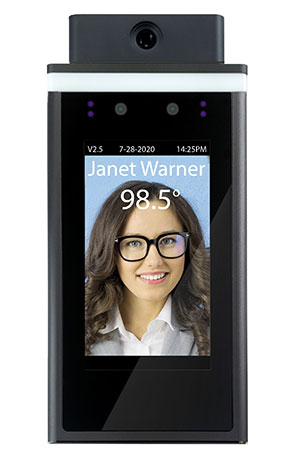
Hytera America Launches SmartGuard Biometrics Access Control Solution
Hytera announces the launch of Hytera SmartGuard, a new biometrics access control solution. SmartGuard provides safe, non-contact body temperature screening to reduce the risk of virus transmission and facial recognition to validate employee identity for building access. SmartGuard is an automated access control device with management software and is targeted to small to medium-sized businesses, medical facilities, schools, and events.
The infrared temperature screening reads the temperature of employees and visitors standing between 12 and 20 inches from the device with an accuracy of 0.54 degrees Fahrenheit. If a temperature reading exceeds the present threshold, SmartGuard provides an audible alarm and sends messages to the management software and handheld devices used by employees in the facility. This eliminates the need for staff using hand-held temperature readers at close proximity.
SmartGuard features a high-definition anti-backlight camera with subject lighting for facial recognition. The facial recognition algorithm provides detection within 200ms and is accurate to 99.8% against non-living attempts such as pictures or videos on tablets and phones. Recognition accuracy is unaffected by protective masks, and SmartGuard can provide an audible reminder if employees are not wearing masks. Facial recognition provides several advantages over traditional card-reader access control devices, including reduced costs associated with printing and distributing cards, and improved security that eliminates the possibility of employees sharing cards.
Hytera SmartGuard has relay contacts and a door opening timer for controlling magnetic door locks and supports the industry standard Wiegand Interface for integration with existing access control systems. The SmartGuard web-based management software tracks all interactions with SmartGuard devices throughout a facility. SmartGuard management software is easy to use and provides comprehensive access control management that associates personnel with access zones. SmartGuard is a network device with an RJ-45 port for wired connectivity, and built-in Wi-Fi for wireless communications with the network server and handheld devices. Employees can use Hytera PNC550 handheld terminals or Android cell phones with the SmartGuard app to monitor SmartGuard interactions and receive temperature violation alarms.
SmartGuard provides flexibility for a variety of deployment options. SmartGuard is typically installed at a main entrance and integrated with the door lock for access control with temperature screening and facial recognition. SmartGuard can also configured for facial recognition only on internal access points after employees have already passed through a temperature screening door, or for temperature screening only at an entrance used for both employees and visitors, such as a medical clinic or retail store.
SmartGuard can also be deployed as a standalone device mounted on a tripod for safe and contact-free temperature screening at a medical facility, event, or campus. Employees can be a safe distance monitoring the temperature screening process with a handheld device. Manual temperature screenings using thermometers or infrared detection guns are time-consuming and are used inside the six-foot social distance limits and can increase the risk of cross-infection.
“Hytera SmartGuard provides non-contact fever detection to create a safer work environment as people return to work and assemble indoors," said Tom Wineland, vice president of sales at Hytera America. "This all-in-one facial recognition, temperature screening, and access control device is easy to configure and install for enhanced safety and security.”